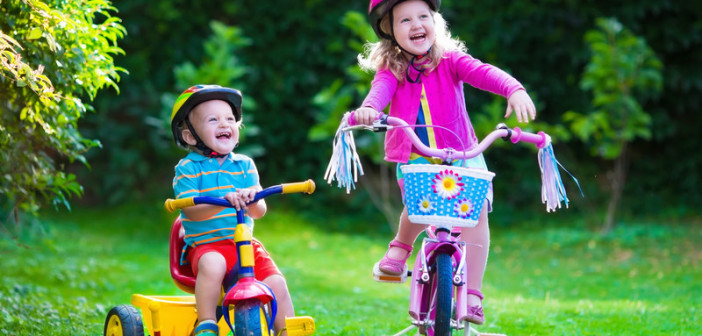It’s well known that helmets are an important part of any bike riding safety routine, but some parents may be overlooking the importance of children on tricycles wearing one. According to a recent article, authors of a new study published in the Journal of the American Academy of Pediatrics say the answer is in the numbers.
According to their estimates, there were 9,340 cases of tricycle-related accidents that sent children to emergency rooms in 2012 and 2013. The most common body part injured: a child’s head — and head injuries can cause lasting damage.
BrainyBunch.info, a website funded by the New Jersey Division of Highway Traffic Safety, reminds us that helmets are 85% effective for protecting you against serious brain injury when worn properly.
“A brain injury happens when your brain moves inside of your skull. Wearing a helmet that absorbs some of the impact can minimize the forces that would otherwise go right to your head. What might have been a devastating brain injury could be reduced to a concussion or mild brain injury from which you can recover 100%.”
Helmet safety advice is important to remember and easy to follow. Adjusting your child’s helmet to fit properly can be frustrating but it is well worth the time and effort. Begin with a helmet that fits your child’s head snugly; no wiggle room!
All you need is two fingers:
- two fingers between the eyebrows and the front edge of the helmet
- two fingers between the chin and the chin strap when it is buckled
- two fingers form “V” shape around the ear
According to the New Jersey Education Association, brain injury is the leading cause of death and disability in children and young adults with nearly a half million children and adolescents treated in emergency rooms yearly. The N.J. Department of Health and Senior Services Center for Health Statistics recorded 1,231 children in New Jersey between the ages of 0-17 were hospitalized with a Traumatic Brain Injury (TBI) in 2007, and 22,436 more children ages 0-17 were taken to emergency rooms with a TBI.
If you believe you or someone you know has experienced a brain injury, local state resources are available. The Brain Injury Alliance of New Jersey (BIANJ) is a statewide nonprofit organization dedicated to improving quality of life after brain injury, and offers the promise of a better tomorrow. The BIANJ was founded in 1981 by a small group of concerned parents of children who had sustained brain injury, and they’ve since grown to become the primary source of information, education, advocacy, support, and hope for people with brain injury and their families in New Jersey. Today, their dedicated staff, board, volunteers, donors, and community partners provide service to 10,000 New Jerseyans each year.
Additionally, New Jersey offers assistance through the state TBI Fund. The TBI Fund provides New Jersey residents of any age, who have survived a traumatic brain injury, the opportunity to access the brain injury related services and supports they need to live in the community.
While sports provide an outlet for enjoyment and fun for all, practicing safety should be remembered at all times.










